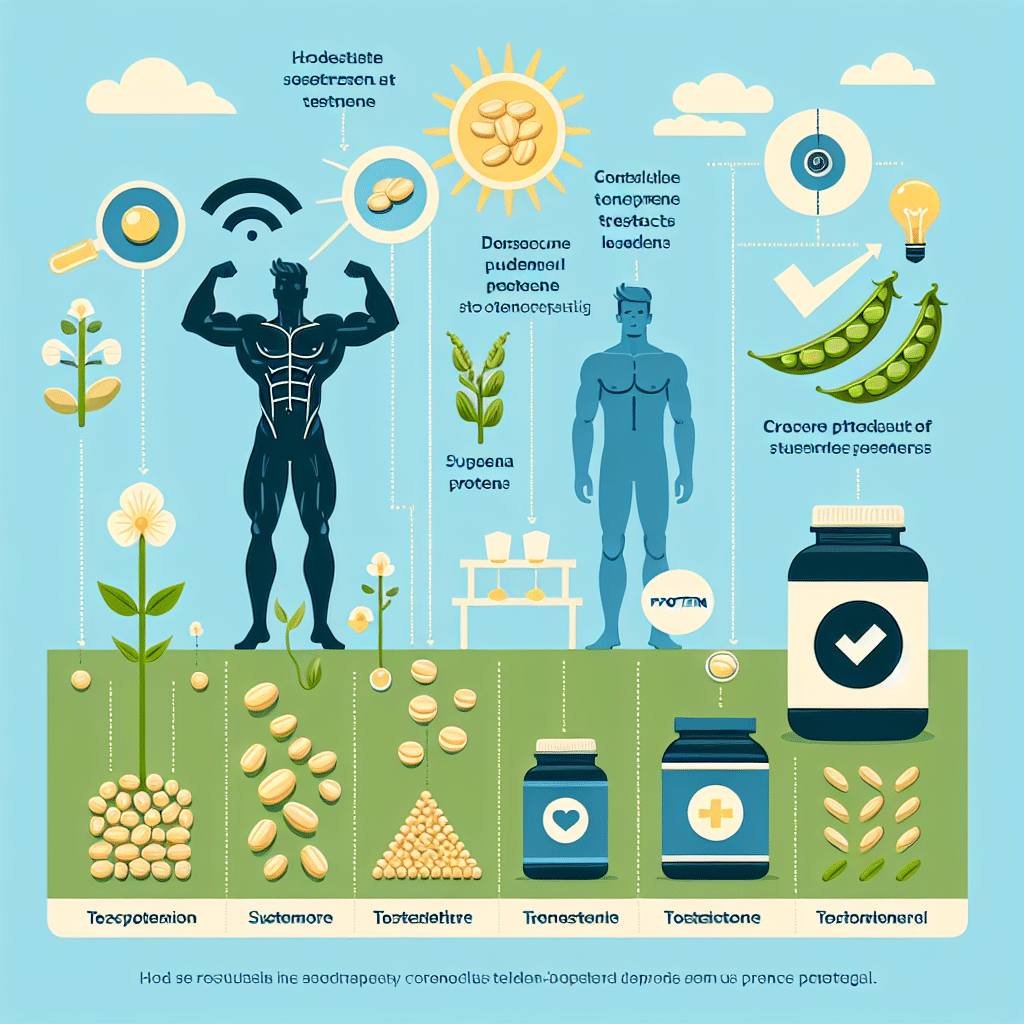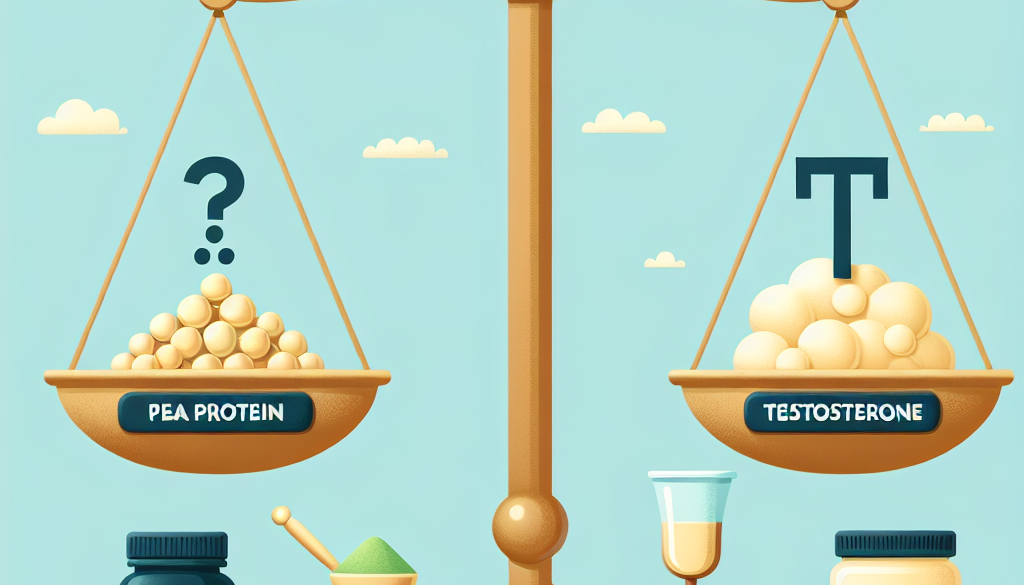Does Pea Protein Lower Testosterone? Deep dive
Table of Contents
- Pea Protein and Testosterone: Unraveling the Truth
- Understanding Testosterone and Its Importance
- Pea Protein: A Brief Overview
- The Link Between Diet and Testosterone
- Research on Pea Protein and Testosterone
- Case Studies and Anecdotal Evidence
- Statistics and Trends in Protein Consumption
- Conclusion: Pea Protein and Testosterone Levels
- Discover ETprotein’s Premium Pea Protein Products
Pea Protein and Testosterone: Unraveling the Truth

With the rise of plant-based diets and the increasing popularity of fitness and health consciousness, pea protein has emerged as a staple in many people’s nutritional regimens. However, there’s been a growing concern among men regarding the impact of plant-based proteins, particularly pea protein, on testosterone levels. This article delves into the scientific evidence to address the question: Does pea protein lower testosterone?
Understanding Testosterone and Its Importance
Testosterone is a crucial hormone in the human body, especially for men. It plays a vital role in muscle growth, fat distribution, bone density, and sex drive. Maintaining optimal testosterone levels is essential for overall health and well-being. Any potential dietary influence on testosterone levels is a matter of concern for many individuals, especially those looking to build muscle, lose fat, or improve their libido.
Pea Protein: A Brief Overview
Pea protein is derived from yellow split peas and is a high-quality alternative to animal-based proteins. It’s rich in essential amino acids, particularly branched-chain amino acids (BCAAs), which are crucial for muscle repair and growth. Pea protein is also hypoallergenic, making it a suitable option for those with allergies to dairy or soy.
The Link Between Diet and Testosterone
Diet plays a significant role in the regulation of testosterone levels. Certain nutrients, such as vitamin D, zinc, and healthy fats, have been shown to support testosterone production. Conversely, diets high in processed foods and low in essential nutrients can negatively affect hormone levels.
Research on Pea Protein and Testosterone
When it comes to pea protein and testosterone, the research is still evolving. Several studies have investigated the impact of various protein sources on testosterone levels, with mixed results. Let’s explore what the science says:
- Animal vs. Plant Protein: Some research suggests that diets higher in plant-based proteins may lead to lower testosterone levels compared to diets rich in animal-based proteins. However, these studies often do not isolate pea protein as a variable.
- Phytoestrogens: Concerns about plant proteins often stem from their phytoestrogen content. Phytoestrogens are plant-derived compounds that can mimic the effects of estrogen in the body. Peas, however, contain negligible amounts of phytoestrogens compared to other plant sources like soy.
- Direct Studies on Pea Protein: Direct research on pea protein’s impact on testosterone is limited. One study on resistance-trained males found no significant difference in testosterone levels when comparing pea protein supplementation to whey protein or placebo.
It’s important to note that many factors can influence testosterone levels, including age, lifestyle, physical activity, and overall diet. Therefore, it’s challenging to attribute changes in testosterone solely to pea protein consumption.
Case Studies and Anecdotal Evidence
While scientific studies are crucial, anecdotal evidence and case studies also provide insights. Some individuals report no change in testosterone levels or masculine characteristics after switching to pea protein. Others claim to experience a decrease in libido or muscle-building capacity, although these reports are often not substantiated by blood tests or controlled conditions.
Statistics and Trends in Protein Consumption
The global demand for pea protein is on the rise, with the market expected to grow significantly in the coming years. This trend is driven by the increasing popularity of plant-based diets and the search for sustainable protein sources. Despite concerns about testosterone, the demand for pea protein indicates that many consumers are satisfied with its health benefits and performance.
Conclusion: Pea Protein and Testosterone Levels
In conclusion, the current body of scientific evidence does not support the claim that pea protein lowers testosterone levels. While more research is needed to fully understand the relationship between pea protein and hormone levels, existing studies suggest that pea protein is a viable and healthful protein source that does not adversely affect testosterone.
Key takeaways include:
- Testosterone is essential for various bodily functions, and diet can influence its levels.
- Pea protein is a high-quality, hypoallergenic source of plant-based protein.
- Current research does not show a significant impact of pea protein on testosterone levels.
- Individual experiences with pea protein vary, and more research is needed to draw definitive conclusions.
For those looking to incorporate pea protein into their diets without compromising testosterone levels, the evidence suggests that it is a safe and effective choice.
Discover ETprotein’s Premium Pea Protein Products
If you’re interested in exploring the benefits of pea protein, ETprotein offers a range of high-quality pea protein products. Their organic pea protein is characterized by a neutral taste, non-GMO, and allergen-free attributes, making it an excellent choice for anyone looking to maintain or increase their protein intake without affecting testosterone levels.
ETprotein’s commitment to purity and quality ensures that you receive a product that supports your health and fitness goals. Whether you’re a bodybuilder, an athlete, or simply someone looking to improve your dietary habits, ETprotein’s pea protein is an excellent addition to your nutritional arsenal.
About ETprotein:
ETprotein, a reputable protein and L-(+)-Ergothioneine (EGT) Chinese factory manufacturer and supplier, is renowned for producing, stocking, exporting, and delivering the highest quality organic bulk vegan proteins and L-(+)-Ergothioneine. They include Organic rice protein, clear rice protein, pea protein, clear pea protein, watermelon seed protein, pumpkin seed protein, sunflower seed protein, mung bean protein, peanut protein, and L-(+)-Ergothioneine EGT Pharmaceutical grade, L-(+)-Ergothioneine EGT food grade, L-(+)-Ergothioneine EGT cosmetic grade, L-(+)-Ergothioneine EGT reference grade and L-(+)-Ergothioneine EGT standard. Their offerings, characterized by a neutral taste, non-GMO, allergen-free attributes, with L-(+)-Ergothioneine purity over 98%, 99%, cater to a diverse range of industries. They serve nutraceutical, pharmaceutical, cosmeceutical, veterinary, as well as food and beverage finished product distributors, traders, and manufacturers across Europe, USA, Canada, Australia, Thailand, Japan, Korea, Brazil, and Chile, among others.
ETprotein specialization includes exporting and delivering tailor-made protein powder and finished nutritional supplements. Their extensive product range covers sectors like Food and Beverage, Sports Nutrition, Weight Management, Dietary Supplements, Health and Wellness Products, and Infant Formula, ensuring comprehensive solutions to meet all your protein needs.
As a trusted company by leading global food and beverage brands and Fortune 500 companies, ETprotein reinforces China’s reputation in the global arena. For more information or to sample their products, please contact them and email sales(at)ETprotein.com today.














